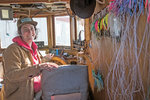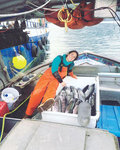Port Townsend’s Kat Murphy can be found each summer chasing coho and king salmon in the salty seas of Southeast Alaska.
This item is available in full to subscribers.
We have recently launched a new and improved website. To continue reading, you will need to either log into your subscriber account, or purchase a new subscription.
If you had an active account on our previous website, then you have an account here. Simply reset your password to regain access to your account.
If you did not have an account on our previous website, but are a current print subscriber, click here to set up your website account.
Otherwise, click here to view your options for subscribing.
* Having trouble? Call our circulation department at 360-385-2900, or email our support.
Please log in to continue |
|


Port Townsend’s Kat Murphy can be found each summer chasing coho and king salmon in the salty seas of Southeast Alaska.
She likens it to “chasing wild herds of buffalo.” On her 38-foot wooden power troller, “Grace,” and with one other crewmember, Murphy spends her days trolling for salmon—a fishing method that leads her through sparkling waters buffeted by Alaska’s rocky coastlines and small towns.
“We’re the wandering trollers,” Murphy said. “Because of our gear type, we’re not limited to these tiny areas.”
Off the coast of Baranof or Kruzof or Coronation islands, in the offshore waters of Southeast Alaska, power trollers like Murphy’s “Grace” run high-tension wires weighted with lead balls off hydraulic gurdies from various locations on their boats. The four lines on her boat are interspersed with glittering lures and hooks to attract the wild salmon.
“It’s amazing being a troller because you see so much of southeast Alaska,” she said. “We have so much space and choice to work with. I can see some incredible wild places.”
This June will be Murphy’s third season fishing in Alaska as the captain of her own boat and the owner of her company, Katfish Salmon Co.
It was her love of being out on the open water that led her to start her business and buy her wooden trolling boat, which was built in 1946 in Seattle.
Her canned salmon can be found at the Chimacum Corner Farmstand, the Manresa Castle and the Hamma Hamma Farm Store. This year, Murphy plans to sell her canned salmon as well as frozen fillets caught from her boat to customers throughout the county.
Murphy moved to Port Townsend in 2014 to attend the Northwest School of Wooden Boatbuilding, where she gained the skills to work as an apprentice shipwright at the PT Shipwrights Co-op.
“I loved working for the co-op, but we would launch the boats and I just missed working on the water,” she said. “Especially in the summer. I’m used to always working on the water, but it was hard to make a living working in the experiential education field.”
In the summer of 2017, she crewed on a power troller long-liner during the salmon fishing season in Alaska and immediately fell in love with it.
“I just really fell in love with both working on the water and also with catching people’s food and processing it and feeling good about how I’m feeding people and contributing to the food economy,” she said.
The next year, she fell in love with the wooden boat Grace, and decided to start her own business. Not only did she buy a boat, but she got a power troll permit for Southeast Alaska and headed up for the summer season in 2018 with one other crewmember.
“It’s a hook-and-line fishery,” she said. “It’s often confused with trawling, which is a different gear-type.”
Right now, Murphy is preparing her boat for the summer fishing season. While spending months on the water, you only have yourself to rely on.
“Accepting that was a big learning curve for me,” Murphy said. She employs one crewmember to go with her each summer. But she also knows that when it comes down to it, she is responsible for her own safety, the productivity of her business and the upkeep of her boat.
“Self-reliance and resilience is important,” she said. “As is creative problem-solving. Keep your cool and laugh about it afterwards.”
The fishing industry is largely male-dominated, so making your way as a female captain and owner of a small business is a challenge, she said.
But Murphy has the support of Port Townsend’s marine trades to back her up.
“Port Townsend is this microcosm of women captains,” she said. “There’s just a much higher percentage than in the rest of the world. So this is kind of an amazing place to be a woman running your own boat.”
Supporting the local economy and being part of the food industry in Jefferson County is Murphy’s goal for her business.
She plans to apply for a loan to begin processing canned and frozen coho fillets.
Hook-and-line fishing brings in fewer fish, but an overall higher quality of salmon.
The fish come up alive and within 30 minutes, Murphy guts, gills, bleeds and ices them. They’re soon delivered either to a town nearby or to a tender, to be processed by canneries. Some fish go to the fresh market, others are blast-frozen, some canned.
She hopes to grow a customer base for her salmon in town.
“Supporting local businesses is really important,” she said. “I’ve caught this food for my community. I want to contribute to a vibrant local economy.”